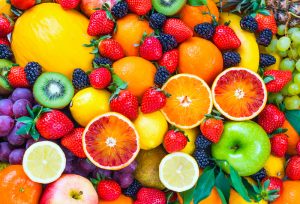 There is no big health secret about the benefits of eating more fruit, but a new study says that expectant mothers could pass some of these benefits on to their newborns. The study says that mothers who eat more fruit during pregnancy are also more likely to give birth to children with higher cognitive function.
There is no big health secret about the benefits of eating more fruit, but a new study says that expectant mothers could pass some of these benefits on to their newborns. The study says that mothers who eat more fruit during pregnancy are also more likely to give birth to children with higher cognitive function.
The study looked at existing data from 688 one-year-old children taken during the Canadian Healthy Infant Longitudinal Development (CHILD) Study. Controlling other factors which might affect learning and development—like paternal and maternal education, gestational age, and family income—the researchers used a traditional IQ scale as a model to determine, in fact, that children born to mothers who ate six or seven servings of fruit (or fruit juice) per day actually placed six or seven points higher when compared to other children.
“We know that the longer a child is in the womb, the further they develop–and having one more serving of fruit per day in a mother’s diet provides her baby with the same benefit as being born a whole week later,” explains lead study author Piush Mandhane.
The University of Alberta Faculty of Medicine & Dentistry associate professor of pediatrics goes on to say, “It’s quite a substantial difference,” Dr. Piush Mandhane, an associate professor of pediatrics at the University of Alberta, said in a press release. “We know that the longer a child is in the womb, the further they develop — and having one more serving of fruit per day in a mother’s diet provides her baby with the same benefit as being born a whole week later.”
furhtermore, Mandhane continues, “We wanted to know if we could identify what factors affect cognitive development. We found that one of the biggest predictors of cognitive development was how much fruit moms consumed during pregnancy. The more fruit moms had, the higher their child’s cognitive development.”
Of course, this conclusion is only the beginning and will yield more research in the years to come to continue searching for more long-term benefits of higher fruit consumption during pregnancy. For example, this study only looked at one-year-old children, so researchers will likely continue to monitor these children to observe the potential for the continued benefits.
